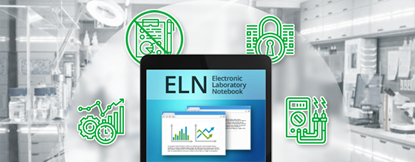Get your free ELN guide

Laboratory Management in the Digital Era: Strategic Application of ELNs
Against the backdrop of China's industrial upgrading and Made in China 2025, the industrial sector is responding to major transformation challenges in the field of digital technology through continuous updating and innovation. It is committed to maintaining its competitive advantage in production capacity and innovation. In this big data environment, the continued growth in data volume makes data processing more complex, requiring us to rethink how we use information and knowledge.
Challenges Faced by Modern Laboratories in the Digital Age
As pioneers in R&D, laboratories face continuous challenges in digital upgrading. How can they ensure the reliability of research results? How can they accurately trace experimental file records? How can they strengthen cooperation among laboratory teams in the digital age? How can they follow good practices and procedures within the laboratory? These are issues that modern laboratories urgently need to address.
Limitations of Traditional Laboratory Notebooks
Traditional lab notebooks are physical books where researchers and scientists manually record their research work and experiments. However, this approach has some obvious disadvantages: handwritten records are prone to errors and it is difficult to ensure consistency and standardization, which may lead to confusion and misunderstandings in data interpretation. The storage and retrieval process of physical notebooks is time-consuming and inefficient, especially when specific experimental data or results need to be found. Paper notebooks may be damaged, lost, or degrade over time, which endangers the integrity and security of research data. Traditional notebooks also make rapid data sharing and collaboration difficult, limiting the efficiency of scientific research cooperation across teams or institutions.
Adopting Electronic Laboratory Notebooks (ELN) for Modern Data Management
These problems highlight the importance of adopting digital record-keeping methods, such as electronic laboratory notebooks (ELN). ELNs are a strategic tool for modernizing and facilitating laboratory data management. They effectively address the challenge of recording laboratory activities by detailing the daily work of researchers, engineers, and laboratory technicians. After digitizing these records, users can structure and store project-related information, thereby improving productivity and making better use of data.
Key Features and Benefits of ELN Tools
With ELN tools, technicians, engineers, and researchers can refer to their experiments and tests in detail, as well as the methods and consumables used. They can also record the stages followed, conclusions, and lab reports, and add any desired comments. This ensures transparency and can justify the testing projects carried out.
ELNs are also an important tool for achieving various goals in research, science, and industry, including the development of new products. They help with risk management and test compliance in the chemical industry. In scientific research fields such as biology, chemistry, physics, geology, and medicine, ELNs are used to record experiments and facilitate data collection.
In the pharmaceutical industry, for example, ELNs are auxiliary tools for developing new drugs, conducting tests, and clinical trials. Biotechnology laboratories use them to record key operations such as DNA, cell, and genome sequencing. Practitioners in the environmental sector (such as collecting and analyzing air, water, and soil quality, monitoring pollutant emissions), the food industry (conducting safety tests and monitoring product traceability), the petroleum industry, and many other industries also use ELNs to meet their monitoring and quality requirements.
Compliance with International Standards Using ELNs
In addition to improving the efficiency of experimental work, relevant regulations that laboratories need to comply with, such as ISO 17025, are also an important reason for promoting the use of ELNs in laboratories. ISO 17025 is an international standard that manages the competence requirements of calibration and testing laboratories. It requires that the information generated in the test report be accurate, complete, and understandable. Regarding the management of non-conformities, the laboratory must be able to justify its handling and management in a rigorous manner to ensure the quality of the results, especially by taking corrective actions. ELNs are important tools for complying with relevant regulations because they allow for a strict interpretation of the activities and tests carried out and for the preservation of reports to comply with confidentiality and traceability requirements.
The Future of Laboratory Management with ELNs
In short, through ELNs, laboratory teams can better manage data, improve work efficiency, and ensure the accuracy and reliability of experimental results. This digital transformation not only aligns with current trends in scientific and technological development but also brings more possibilities and opportunities to laboratory work.

If you would like to know more about ELNs, you can scan the QR code below and fill in the information to receive your free copy of BASSETTI’s ELN guide!
